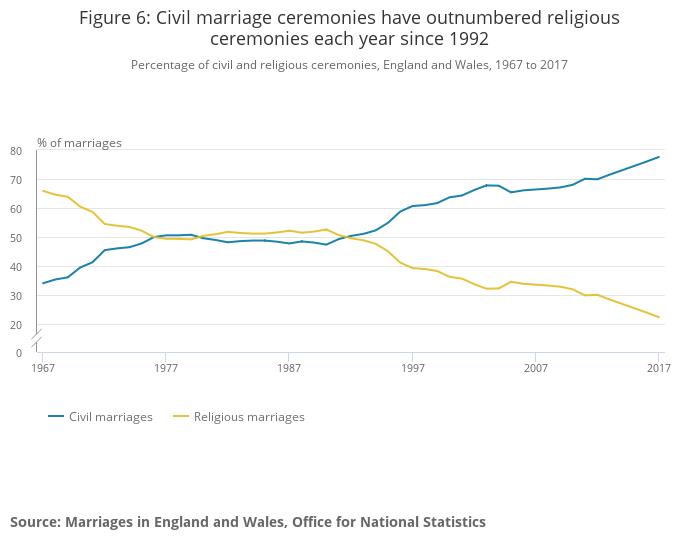Mariages religieux et civils en Grande-Bretagne : évolution des tendances et défis de la reconnaissance
The number of religious marriages in the UK has been in gradual decline, with more and more couples opting out for social ceremonies. According to the figures released by the Office for National Statistics, less than a quarter (22%) of all marriages in 2017 were religious ceremonies, compared to 49% in late 1970s. This represents the lowest percentage on record (ONS – Release date : 14 April 2020). The reasons behind this fall are attributed to the decline in the overall number of all marriages, high costs of weddings, as well as the rise in popularity of civil marriage ceremonies.

In 2018, the Law Commission started a review of marriage ceremonies in Britain, with the view of giving more flexibility for religious and non-religious organisations to conduct marriage ceremonies. At the same time, some questions have also been raised in relation to the accuracy of registering religious marriages amongst religious minorities (e.g. see Akhtar 2018 on Muslim marriage practices and legal considerations). Key debates, however, have increasingly centred on the issue of civil marriages and humanist weddings.
In July 2019, the UK Government announced its upcoming review into marriage laws in England and Wales. The remit of the work given to the Law Commission included ‘developing a scheme that would allow non-religious belief groups, such as humanists, and independent celebrants to celebrate weddings’. Some of the proposed changes included fast-track legal recognition of civil marriages taking place in outdoor venues, but it omitted legal recognition of humanist marriages. Humanists have continued to campaign on the issue : if religious people were given ‘a choice between being married by a civil registrar or being married by a representative of their religion’ those who favoured a humanist wedding ‘have to have a separate civil marriage in order to be legally married’. Not only would this carry extra costs and administrative burdens but it also would be deemed discriminatory.
Humanist organisations have long campaigned for legal recognition for both humanist and same-sex marriage ceremonies. Humanist marriages have already been recognised as legally binding in Scotland (since 2005), Northern Ireland, Ireland and Jersey, with Guernsey currently in the process of extending legal recognition too. Examples of different processes of legalising humanist marriages in Scotland and Northern Ireland can be found in Humanist Wedding Ceremonies, 2019 pp. 17-19.
There has been a growing public support to grant legal recognition in England and Wales. However, under current legislation, there are no specific provisions for marriages to be conducted according to any non-religious system of belief (e.g. humanism).
In January 2020, Baroness Meacher introduced the Marriage (Approved Organisations) Bill in the House of Lords. The Bill aims to amend the Marriage Act 1949 to permit authorised belief organisations to solemnise marriages. The amendment states that ‘for the purposes of subsection (1), the British Humanist Association is an authorised belief organisation’ (Marriage (Approved Organisations) Bill 2020, p. 3). A more detailed discussion of the Bill has been provided by Frank Cranmer and David Pocklington 2020.
The Bill received its first reading on 9 January 2020. Second reading and the general debate on all aspects of the Bill is yet to be scheduled – watch this space for further updates on the subject.
10 juin 2020 Katya Braginskaia





